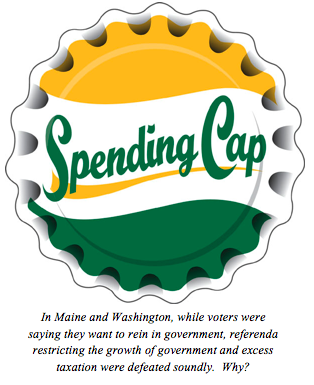By Bill Wilson
Call it a conservative conundrum.
Taxpayers who went to the polls last night are clearly outraged by a year filled with massive financial bailouts; the nationalization of the banking, mortgage, and auto industries; and proposed takeover of the energy and health care industries. On their way out of polling stations, they told pollsters across the country that they were overwhelmed by the economy, lost jobs, taxes, and reckless government spending.
However, in Maine and Washington, while voters were saying they want to rein in government, referenda restricting the growth of government and excess taxation were defeated soundly. Why?
Question 4 in Maine and Initiative-1033 in Washington would have capped the yearly growth of government spending and tax increases to no more than the yearly increase in population plus inflation. In order for the politicians to spend more, state residents would have had to approve it by ballot.
However, because the public sector unions are so powerful, they can strong-arm any attempt to limit their stranglehold on taxpayers through lies, fear, and distortions. Residents were threatened with chaos and destitution if taxpayers refused to continue to pay exorbitant protection money that they demand.
They are bankrupting cities and states across the country like California and New Jersey. So unsustainable are these public sector unions that they are even on the federal dole, receiving tens of billions in subsidies from the $787 billion “stimulus”. They are a potent political force.
However, there is hope. In a local election where the stakes are plainer to see when government grows out of control, a city charter amendment passed in Manchester, New Hampshire that caps spending and taxes to no more than increases in inflation. It would require a two-thirds vote in by the city’s elected aldermen to override the limitation.
According to the Union Leader, “The day was about a year and a half in the making. Proponents, led by a conservative group known as the New Hampshire Advantage Coalition, spent the summer of 2008 collecting thousands of signatures in hopes of securing a spot on the ballot that November. Their effort was thwarted by a narrow majority of aldermen, who argued that voters would need more time to familiarize themselves with the issue.”
But not even the delays were enough to stop this amendment, and the drawn-out fight crystallized the issues involved. Even in this largely Democrat-controlled city, limiting the unbridled expansion taxes and spending was on the minds of voters. It did not drive Democrats from power, either. They retained control of the city’s aldermen.
It was an issue that drove voters to the polls in 2009 nationwide: the unsustainable growth of government. The American people are, rightly so, shocked at the explosion of the federal debt now at $12 trillion, the record-setting $1.4 trillion budget deficit, and unprecedented expansion of the nation’s money supply, which has more than doubled in a year.
To make matters worse, by 2011, the national debt will equal the annual Gross Domestic Product. And in 2020, the debt will surpass $20 trillion. It is a trend that if not reversed will leave the nation in financial ruin.
But it’s deeper than that.
2009 is a year where the political landscape of the nation has been shifted. Politically, it turns out that the chief beneficiary of the spending binge was not the party responsible for the handouts, kickbacks, and bailouts, but the out-party: Republicans.
It was a night that saw Republicans gain two governorships—a landslide in Virginia and a stunning upset in Jersey—and the political establishment was shocked to its core as the Conservative Party came within a hair’s breath of taking New York’s 23rd Congressional District.
It is a trend that has national implications. If vulnerable and Blue Dog members of the House of Representatives were feeling queasy about voting for the $2.1 trillion government-run socialized medicine scheme before last night, surely by now they are carsick as the American people rebel against the Obama regime.
On the Senate side, the legislation may be slowed until 2010, at least. The national energy cap and tax could be all but dead if national Democrat leaders make course corrections to avoid electoral collapse a year from now.
Taxpayers, however, need not wait for Congress to solve the national debt and save the dollar.
A national plan offered by lawmakers would be good news for the American people, for taxpayers, and for limited government. The opposition may want to look to the model of Manchester, New Hampshire, where they are limiting by law the growth of government.
Bill Wilson is the President of Americans for Limited Government.


